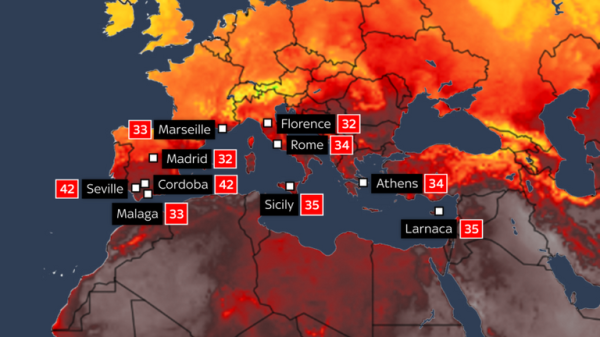
Europe is baking under the roasting sun of its latest heatwave, with potential for temperatures to hit 45C in some parts of Spain.
Italy and Greece are also experiencing hot spells, with climate experts declaring the world has just had its hottest week on record.
So what is happening in Europe and where will be the hottest place this week? What about climate change? Sky News answers some of the key questions in this explainer.
What is happening, and why?
Temperatures across Europe are spiking as the continent is hit by a heatwave, with the mercury perhaps 5C or 10C above average.
Why is all of this happening? There are a few reasons.

An area of high pressure is trapped over the southern Mediterranean, in Spain in particular, and clouds of Saharan dust are also making conditions worse.
Another contributing factor is unusually high sea surface temperatures, which mean that cooler air is not blowing inland off the Mediterranean.
And scientists say the fingerprints of climate change can be found on events like this – more on that later.

And the heatwave is called Cerberus?
That’s right. The Italian Meteorological Society has named the heatwave after the mythical monster, Cerberus, who was said to guard the gates of Hell.
In Dante Alighieri’s Inferno, the famous work by the Italian poet about a journey through Hell, Cerberus is a three-headed dog who torments sinners in the third circle.

Where is the hottest part of Europe?
It looks like Spain will take the top spot this week, with the country’s weather service warning thermometers could hit 45C (113F) in south-eastern areas of the Iberian Peninsula.
The same temperature was reached on Monday in a village near Granada at the start of the heatwave.
Meanwhile, 10 cities in Italy have been put on high heat alert for older people, from Bolzano in the north, extending southward to Bologna, Florence and Rome.

Temperatures are expected to reach 40C (104F) in the Sardinian inland Wednesday.
The heat is also rising in Greece, where temperatures were forecast to reach up to 44C (111F) in some parts of the country in the coming days.
Authorities banned access to nature reserves and forests to reduce the risk of wildfires, while municipalities were opening air-conditioned areas in public buildings for people to shelter from the heat.

When will the heatwave end?
There’s potentially some good news for Spain with cooler weather on the way.
Ruben del Campo, a meteorologist from Spain’s national weather agency, said: “On Wednesday, we expect temperatures to fall overall with the arrival of cool winds from the north and east, with the exception of the southeast and southern Andalusia, where hot winds blowing from the interior will cause temperatures to soar.”
While some relief is in store in the coming days for the Iberian Peninsula, other European countries will sweat through the weekend.
According to the Met Office, the heatwave could last another week and probably longer in some areas.
“There are no signs of any major changes in weather type the next couple of weeks at present,” Met Office spokesperson Nicola Maxey told Sky News.

Is this caused by climate change?
The latest heatwave comes after the world experienced its hottest week on record at the start of July – following the hottest ever June – according to the World Meteorological Organisation.
Previous studies have linked heat in Europe with climate change.
Earlier this week, a new study revealed more than 61,000 people died in Europe last summer as a result of extreme heat.
Ms Maxey from the Met Office said there has not been an attribution study linking this latest spell of hot weather to climate change.
But she added: “What we have is that the base level of heat is higher so we are seeing increased levels of heat due to climate change so when you get a heat wave the temperatures that the heat reaches (are higher).”
